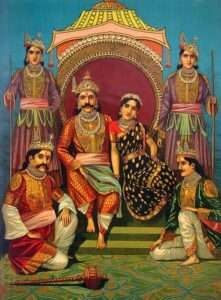In those days, among the upper social classes, the Kshatriyas were the only ones allowed to hunt, but only certain animal species. They thus learned to kill to defend their territories.
One day, while Shantanu was chasing a deer, he perceived the aroma of forest flowers, so good and intense that he couldn’t resist it. Determined to take those flowers away with him, he followed the trail down to the river, where he saw a woman cleaning a boat. She was the one who gave off that celestial scent. He approached her and gently told her:
“I smelled a wonderful perfume and followed it, but I certainly didn’t expect it to come from a young lady. Who are you?”
“My name is Satyavati, and I am the adopted daughter of a fisherman,” she replied, embarrassed by the looks of desire the king gave her.
“You are so beautiful,” he said impetuously. “Your charm has bewitched me, and I would like to have you with me. I am king Shantanu, the lord of the land of Bharata. I want you as my wife. Come with me.”
“You know I can’t decide for myself,” Satyavati replied. “Ask my father. I accept your proposal, and if he does too, I will follow you without delay.”
She took him home, and Shantanu asked the fisherman to give him Satyavati as his wife. The fisherman thanked the gods for the good fortune his daughter had, but asked that certain conditions be respected.
“This marriage is a great thing for my daughter,” he said, “but I also want my grandchild to become the king after you leave the throne; if you agree to this, you can have her as a wife.”
Shantanu was flabbergasted.
“This is all absurd,” he said. “You know very well that I already have a son, Devavrata, who is the crown prince, and I certainly cannot deprive him of his birthright. Ask me what you want: riches, honors, but not this.”
It was all in vain; the fisherman would accept nothing except the promise that Satyavati’s sons would reign on the throne of Hastinapura.
Shantanu was in love with that young woman, but he couldn’t do that harm to his son. So, he returned to the city heartbroken, aware that he could never forget Satyavati.
A few weeks passed and Devavrata realized that his father was neither happy nor calm as he was before, and he asked him why. Shantanu replied evasively and refused to reveal his secret. But as the days went by, he became more and more locked in himself and refused to talk to anyone about it. Devavrata, worried, began to investigate until, with a shrewd deception, he managed to convince the coachman who had witnessed the scene to tell him what had happened.
Having solved the mystery, the same day Devavrata went to see the fisherman and tried by all means to persuade him to give his daughter in marriage to his father. But he found him adamant; he was determined to see his grandchildren on the throne.
“If that is all you want,” the virtuous prince told him, “you can be satisfied. I do not aspire to the pleasures and power of this world and have no difficulty in giving up my birthright on behalf of your grandchildren. You will get what you want, as long as my father is happy.”
“You are a young man with moral principles as big and solid as the mountains,” the fisherman replied admiringly, “and I know you will keep your promise, but what will happen with your children? How will I know that when they reach the right age they will no claim their right to the throne?”
“I want nothing more than to know that my father is happy,” Devavrata retorted firmly, “this is my main goal. If you are afraid that my children might one day claim the throne from your grandchildren, I swear I won’t get married and that this vow won’t break under any circumstances.”
As soon as Devavrata uttered the vow of perpetual celibacy, a heavenly voice was heard saying,
“Bhishma, Bhishma”!
which means,
“The one who takes a difficult vow and keeps it”.
From that day on, Devavrata was called Bhishma.
Shantanu was not at all happy with his son’s oath, but Devavrata made him understand that this decision would prove to be good for both of them. Thankfully, the monarch blessed his son to die only when he wanted to.
Thus, Shantanu married Satyavati.
Two children were born from them: the first was called Citrangada and the second Vicitravirya.
At the right moment, inexorable time stripped the great and virtuous king Shantanu of everything, and he died when Citrangada was still too young to rule. Bhishma assumed the leadership of the state until his brother reached the age to rule.
As soon as Citrangada came of age, he ascended the throne, but did not rule for long. He was defeated and fell dead in a fight against a Gandharva who had the same name as him.
His younger brother, Vicitravirya, was still too young, and so the burden of government fell on Bhishma’s shoulders again.
This is a section of the book “Maha-bharata, Vol. 1”.
To buy the complete book, click above
Post view 1044 times




Leave a Reply